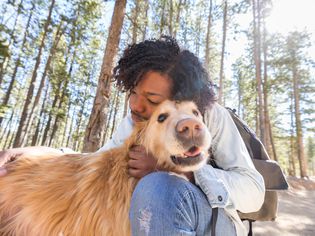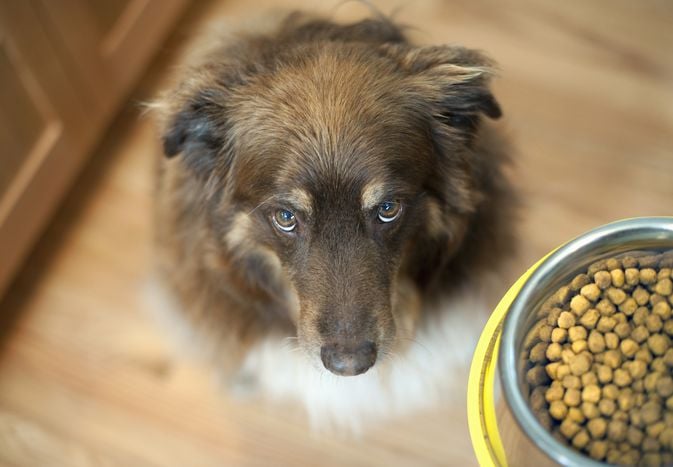While it may be true that the holidays are the most wonderful time of the year, it’s certainly not the safest time of the year for our dogs! There are a lot of tempting treats to swipe from the table and decorations to chew on, so it’s best if pet parents are aware of holiday hazards for pets. Among all the chocolates, strings of lights, and poinsettias, there is one risky holiday item you may not have considered before — candy canes.
Here’s why you need to keep the candy canes away from your dog so that your holidays remain jolly.
Can Dogs Eat Candy Canes?
It's simple—no, dogs should not eat candy canes. The ingredients in candy canes have no nutritional benefits for your dog, and some of the ingredients may be toxic.
Candy Cane Ingredients
When you think of a candy cane, you probably imagine the J-shaped peppermint version with red and white stripes. Most of these candy canes include the following ingredients:
- Sugar
- Corn syrup
- Flavoring, like peppermint extract
- Artificial colors
While the ingredients in these aren’t necessary toxic to dogs in small amounts, they’re not good for them. Peppermint can cause stomach upset for some dogs. And some candy canes contain other ingredients which are toxic, such as:
- Chocolate
- Xylitol (a popular sugar alternative)
Risks of Feeding Candy Canes to Dogs
Though it may be tempting to snag a holiday photo of your dog chomping on or carrying around a candy cane, the risks these holiday treats carry outweigh the preciousness of the photo opportunity. The hazards of candy canes to dogs include:
- Poisoning: Toxins like xylitol or chocolate can cause serious issues in dogs like low blood sugar, liver failure, abnormal heart rhythms, and death.
- Gastrointestinal upset: The sugar, peppermint, and other ingredients in candy canes can lead to vomiting, diarrhea, and loss of appetite.
- Choking: The hook at the end of the candy cane can lead to choking if the dog tries to swallow it without chewing. Pieces of wrapper can also be inhaled, leading to choking.
- Gastrointestinal blockage: If your dog gets into the candy canes and eats a large amount of plastic or the candy cane container, the foreign objects can cause a blockage in your dog’s stomach or intestines, which may require surgery to remedy.
Consumption of a candy cane could especially be dangerous for dogs with specific conditions, such as diabetes or inflammatory bowel disease (IBD). The sugar in the candy cane could affect a diabetic dog’s blood sugar levels, and dogs with sensitive gastrointestinal systems may have an abnormally strong reaction to consuming candy cane and other holiday treats.
What to Do If Your Dog Eats a Candy Cane
If your dog eats a candy cane, you’ll first want to check the ingredients. If your dog has no underlying health conditions and ate a regular candy cane that doesn’t contain xylitol or chocolate, you are usually okay to monitor at home. However, you should immediately remove all access to the candy canes to stop further consumption.
You should contact your veterinarian if:
- The candy cane contains xylitol or chocolate (this is an emergency).
- Your dog is vomiting or having diarrhea.
- Your dog is a diabetic or has a gastrointestinal health condition
Safe Alternatives to Candy Canes for Dogs
Your dog has safer options than candy canes this holiday season. These include:
- Holiday-themed commercial dog treats
- Pumpkin
- Apples (remove core and stem)
- Cranberries
- Unseasoned, cooked chicken breast
- Unseasoned, cooked turkey meat (avoid skin)
- Chew toys that are shaped like candy canes
You could also consider looking for pet-safe holiday treat recipes to try making at home.
If you're hanging candy canes on the tree or putting them in stockings, make sure these are up high enough that your dog (or a mischievous cat) cannot knock them down.
Remember that candy canes have no nutritional benefit for your dog and could be dangerous! Hazards include toxin exposure, stomach upset, choking, and blockage of the stomach or intestines. Keep the candy canes out of your pet’s reach, and instead, choose pet-safe holiday treats to keep the season merry and bright.








Comments on " The Risks of Candy Canes for Dogs: What Pet Parents Need to Know" :